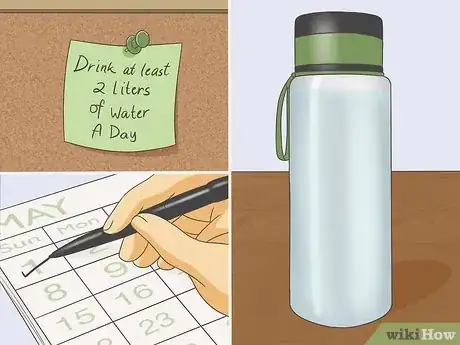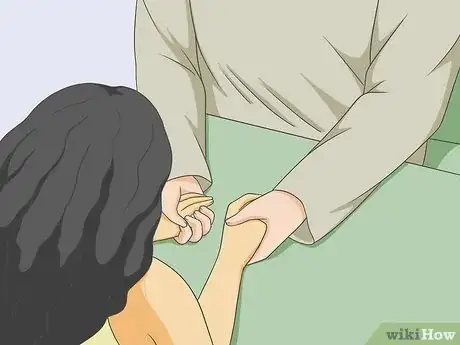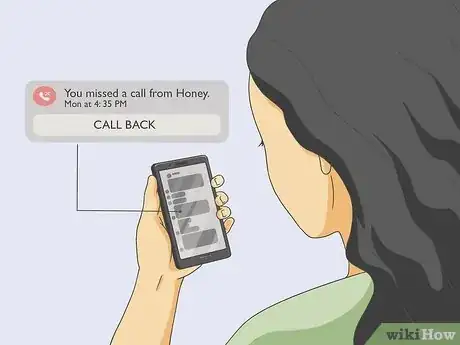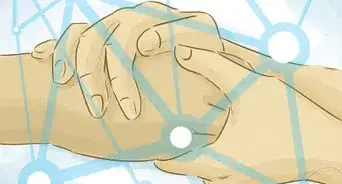This article was co-authored by Moshe Ratson, MFT, PCC. Moshe Ratson is the Executive Director of spiral2grow Marriage & Family Therapy, a coaching and therapy clinic in New York City. Moshe is an International Coach Federation accredited Professional Certified Coach (PCC). He received his MS in Marriage and Family Therapy from Iona College. Moshe is a clinical member of the American Association of Marriage and Family Therapy (AAMFT), and a member of the International Coach Federation (ICF).
There are 11 references cited in this article, which can be found at the bottom of the page.
This article has been viewed 61,080 times.
Self-esteem is the opinion you have of yourself.[1] If you have low self-esteem, it can influence your perception of yourself and also your romantic relationship. You may not feel worthy of love or have intense fears of abandonment. Low self-esteem can lead to low relationship satisfaction and lower levels of trust and more conflict. However, by tweaking the way you interact with your partner and by challenging your mindset, you can begin to make positive changes in your relationship.
Steps
Accepting Yourself
-
1Use positive affirmations.[2] Making positive self-talk a priority is a good way to improve your self-esteem. Try to take a few minutes every day to say something nice to yourself. This can be a simple compliment or simply reminding yourself that you love yourself.[3]
- Every day, say (or write), “I love and accept myself unconditionally for who I am.” For more information, check out How to Improve Self Esteem with Positive Affirmations.
- Or, try looking in the mirror and giving yourself a compliment about your physical appearance every day. For example, you can say, “I love how my hair looks today! It is so shiny and sleek!”
-
2Practice self-compassion.[4] Accept that you are human and are having a human experience.[5] This can help you remember that you do not suffer alone and that you are connected to others. Everyone makes mistakes and finds themselves in situations out of their control. Remembering this can help you be more compassionate toward yourself and others.
- Allow yourself to experience your emotions. Don’t stifle your emotions but don’t explode, either. Remember that it’s normal to have emotions and expressing them is okay. Emotions come and go and do not define you, no matter how bad they feel. For example, if you feel neglected by your partner, recognize that it’s okay to feel bad, but these emotions do not define you or the relationship.
Advertisement -
3Identify your strengths and weaknesses.[6] Making a list of 10 of your strengths and 10 of your weaknesses is a good way to start building your self-esteem. Try dividing a piece of paper into two columns and then write 10 of your strengths on one side and 10 of your weaknesses on the other.
- Many people find it easy to identify weaknesses, but identifying strengths can be more challenging. To identify your strengths, think about times that people have complimented you. These can be little things, such as times people have remarked, “You’re such a good listener!” or “You are really good at drawing!” Even if you think it is not worth listing, add it to your strengths list.
- Try not to compare yourself to others. Instead, remind yourself that everyone has something they are good at and focus on what you are good at.[7]
-
4Set realistic goals. Setting large, unrealistic goals can create a situation where you are not meeting your own expectations and this can damage your self-esteem. To prevent this from happening, try to set realistic goals for yourself.[8]
- Make sure that your goals are specific and that you have a way of measuring them. For example, a specific and measurable goal might be something like, “I want to improve my mile time by 30 seconds by the end of the month.”
- If your goal is too large, then this can also be overwhelming. Try to break large goals into more manageable ones as well. For example, instead of setting a goal to find a better job, you could set smaller goals for yourself, such as to work on your resume or to apply for five new jobs every week.
-
5Acknowledge your accomplishments. Sometimes your accomplishments might seem to go unnoticed by people, but you can always acknowledge them yourself. Try making a point of acknowledging all of your accomplishments, even if you think they are too small to acknowledge.
- For example, if you have been trying to eat healthier and you prepared a healthy dinner for yourself, then you could note this in your journal with something like, “Had steamed broccoli and salmon for dinner tonight! Way to go me!”
- Another option is to look yourself in the mirror and congratulate yourself on your accomplishments. For example, if you studied really hard for a big test, then you might look yourself in the mirror and say, “You did such a good job! I am so proud of you for all the hard work you put in!”
-
6Take good care of yourself. Taking good care of yourself is also important for building self-esteem. By taking good care of your body and mind, you will be sending the message to yourself that you deserve good treatment. Some things you can do to take good care of yourself include:[9]
- Practicing good hygiene, such as by showering every day, combing your hair, brushing your teeth, using deodorant, and wearing clean clothes.
- Making time to do things you enjoy, such as playing an instrument, reading, watching movies, or painting.
- Taking care of your physical health, such as by preparing healthy meals for yourself, exercising, and getting plenty of sleep.
- Managing stress, such as by meditating, practicing yoga, or doing deep breathing exercises.
-
7See a therapist. If you’re unsure of where to begin or how to see yourself more positively, therapy can be a great place to start. Talk therapies such as cognitive behavior therapy (CBT) can help you begin to feel more confident and accepting of yourself.[10]
- To find a therapist, contact your insurance provider, local mental health clinic, or obtain a recommendation from a physician or a friend.
Interacting with Your Partner
-
1Practice being assertive.[11] Having low self-esteem may mean you have difficulty expressing yourself in the relationship. Practice being assertive in your relationship by directly and honestly communicating your wants, needs, feelings, beliefs, and opinions.[12] This can help you find your voice and allow you to see that what you think and feel is important in your relationship.
- Don’t just go along with what your partner wants to do. For example, if your partner wants to see one movie and you’d like to see a different one, speak up and share your wishes. Say, “I know you want an action movie, but I’d like a comedy. Are you up for seeing two movies, or should we watch one tonight and one tomorrow?”
- Know that your needs are important. If your partner is worried about being late somewhere, say, “I know it’s important for you to be on time, however, I need some time to eat before we leave.”
-
2Believe the positive things your partner says about you. If your partner finds you attractive, intelligent and hardworking, accept that these may be traits that you possess. While you may be quick to ignore or combat these qualities, you can begin to see them in yourself and begin to see yourself more like your partner sees you over time.
- If you have a difficult time accepting how your partner sees you, ask yourself, “Is it possible I may have this quality? When have I noticed this quality in myself?”
-
3Avoid constantly seeking approval. Getting approval from your partner may feel good, but the effects are often short-lived and needed again. This can feel like a constant battle of wanting to have approval and then becoming upset when your partner doesn’t give it to you. Remind yourself that you don’t need anyone’s approval, either from your parents, friends, or partner. You are worthwhile and do not need anyone’s approval to be loved or cared about.[13]
- Seeking approval might look like asking questions such as, “Do I look good in this? Do you love me? Am I good enough for you?”
- Don’t rely on compliments from your partner to maintain your self-esteem. Compliments may feel good, but you may revert back to negative thoughts about yourself or need constant compliments to feel good about yourself.[14]
-
4Ask for help from your partner. Talk to your partner about the specific things you struggle with and how you could use their support. Ask your partner to listen to you without interrupting or trying to solve your problems. Ask for a hug when you need it. Let your partner know you have a hard time asking for help, and while you work on expressing your needs you’d like it if they offered help.[15]
- Say. “It’s hard for me to ask for help because I don’t feel like I deserve it or I don’t want to bother you. There are certain things I would like your help with and I’d like to discuss them with you.”
-
5Have fun together. Do enjoyable things together regularly.[16] Find an activity that neither of you has done before and go do it together. It can be comforting to try something new knowing that it’s new for your partner as well. If you feel silly, it’s likely that your partner does, too, and you can laugh about it together.
- Try swing dancing, painting, or try a new restaurant together.
Adjusting Your Mindset
-
1Approach the relationship with an open-mind. You may have fears of abandonment or being hurt. However, these fears can keep you guarded and not fully in the relationship.[17] This behavior may sabotage the relationship, or you may try to leave your partner before he or she leaves you. Release your guard and be willing to be open, honest, and vulnerable with your partner.
- Let go of any assumptions you may have about the relationship related to your self-esteem. For example, you may fear (or expect) your partner to cheat, which can make your partner feel like you do not trust them.
- If you’ve been hurt in a past relationship, don’t assume that your current partner will do the same. This can strain your relationship.
-
2Stop testing your relationship. If you feel unlovable, you may doubt your partner’s intentions or actions of love toward you. If you believe you are unlovable, you might doubt your partner’s intentions for you and the relationship.[18] This is not healthy and creates an atmosphere of distrust in your relationship, which does not feel good for you or for your partner.
- You may test your partner by not calling or texting, purposefully not discussing your plans, or flirting with someone else in front of your partner. These actions set your relationship up to fail.
-
3Temper your jealousy. If you have low self-esteem, you may feel constantly threatened by your partner’s behavior. An innocent talk with a co-worker may feel like your partner is cheating on you. Recognize that the jealousy may exist because you feel bad about yourself, not because your partner is trying to hurt you. If you start to feel jealous, ask yourself whether you are thinking logically and fairly. One way to curb feelings of jealousy is to stop comparing yourself to others.[19]
- If you find yourself catastrophizing (“He’s talking to another girl. He must be flirting. He must like her. He’s going to break up with me.”), slow down and think more rationally. For example, say to yourself, “He’s talking to another girl. It seems like a normal conversation and I have no reason not to trust him.”
-
4Acknowledge positives in the relationship. Don’t brush off compliments from your partner. Instead, listen to your partner’s compliments without rebuffing them. Acknowledge what you contribute to the relationship and ask your partner what he or she appreciates about you.[20]
- For example, if your partner says, “You look very attractive tonight,” don’t make an excuse or try to undercut the compliment. Instead, say “thank you.”
-
5Avoid taking on all the blame. You may avoid confrontation or conflict if you have low self-esteem. You may think that the fight was your fault and that you don’t have the right to talk to your partner about it. However, asserting your boundaries and communicating effectively are important parts of a relationship.[21]
- If you find that you blame yourself for every fight or conflict, take a step back and ask if you’re being fair with yourself.
Expert Q&A
-
QuestionWhat causes low self-esteem in a relationship?
 Moshe Ratson, MFT, PCCMoshe Ratson is the Executive Director of spiral2grow Marriage & Family Therapy, a coaching and therapy clinic in New York City. Moshe is an International Coach Federation accredited Professional Certified Coach (PCC). He received his MS in Marriage and Family Therapy from Iona College. Moshe is a clinical member of the American Association of Marriage and Family Therapy (AAMFT), and a member of the International Coach Federation (ICF).
Moshe Ratson, MFT, PCCMoshe Ratson is the Executive Director of spiral2grow Marriage & Family Therapy, a coaching and therapy clinic in New York City. Moshe is an International Coach Federation accredited Professional Certified Coach (PCC). He received his MS in Marriage and Family Therapy from Iona College. Moshe is a clinical member of the American Association of Marriage and Family Therapy (AAMFT), and a member of the International Coach Federation (ICF).
Marriage & Family Therapist It can be caused by low confidence and unhealthy boundaries. Talk with your partner to talk about the boundaries and be sure to practice self-compassion. Recognizing the positive attributes of the relationship can definitely change your outlook.
It can be caused by low confidence and unhealthy boundaries. Talk with your partner to talk about the boundaries and be sure to practice self-compassion. Recognizing the positive attributes of the relationship can definitely change your outlook.
References
- ↑ https://www.betterhealth.vic.gov.au/health/healthyliving/self-esteem
- ↑ Moshe Ratson, MFT, PCC. Marriage & Family Therapist. Expert Interview. 7 August 2019.
- ↑ https://health.clevelandclinic.org/do-positive-affirmations-work/
- ↑ Moshe Ratson, MFT, PCC. Marriage & Family Therapist. Expert Interview. 7 August 2019.
- ↑ https://cmhc.utexas.edu/selfesteem.html
- ↑ Moshe Ratson, MFT, PCC. Marriage & Family Therapist. Expert Interview. 7 August 2019.
- ↑ http://au.reachout.com/steps-to-improve-self-esteem
- ↑ https://kidshealth.org/en/teens/self-esteem.html
- ↑ https://mhanational.org/taking-good-care-yourself
- ↑ http://www.nhs.uk/Livewell/mentalhealth/Pages/Dealingwithlowself-esteem.aspx
- ↑ Moshe Ratson, MFT, PCC. Marriage & Family Therapist. Expert Interview. 7 August 2019.
- ↑ https://www.betterhealth.vic.gov.au/health/healthyliving/self-esteem
- ↑ https://psychcentral.com/health/steps-to-stop-seeking-approval-from-others
- ↑ https://cmhc.utexas.edu/selfesteem.html
- ↑ https://cmhc.utexas.edu/selfesteem.html
- ↑ https://www.betterhealth.vic.gov.au/health/healthyliving/self-esteem
- ↑ https://www.psychologytoday.com/blog/me-we/201312/10-ways-low-self-esteem-affects-women-in-relationships
- ↑ https://www.psychologytoday.com/blog/me-we/201312/10-ways-low-self-esteem-affects-women-in-relationships
- ↑ https://www.betterhealth.vic.gov.au/health/healthyliving/self-esteem
- ↑ https://www.betterhealth.vic.gov.au/health/healthyliving/self-esteem
- ↑ http://psychcentral.com/lib/self-esteem-struggles-and-strategies-that-can-help/
About This Article
Low self-esteem can make you feel less satisfied in your relationship, but luckily there are things you can do to improve how you feel about yourself. Try practicing positive talk, which is when you say something good to yourself to give you a boost. For example, you might look in the mirror every day and tell yourself that you like one of your features. Make time to take care of yourself, like by practicing good hygiene, doing your favorite hobby, or meditating to manage stress. Doing these things will help you value yourself and your needs. Try to state your wants and desires clearly to your partner, since being assertive is an important part of building your self-esteem. For example, if you want to see a different movie than they do, tell them so. Try to do a new activity with your partner you haven’t done before, like swing dancing or painting, since taking on a new challenge together can help boost your confidence. For tips from our Relationship co-author on how to cope with feelings of jealousy, read on!













































































